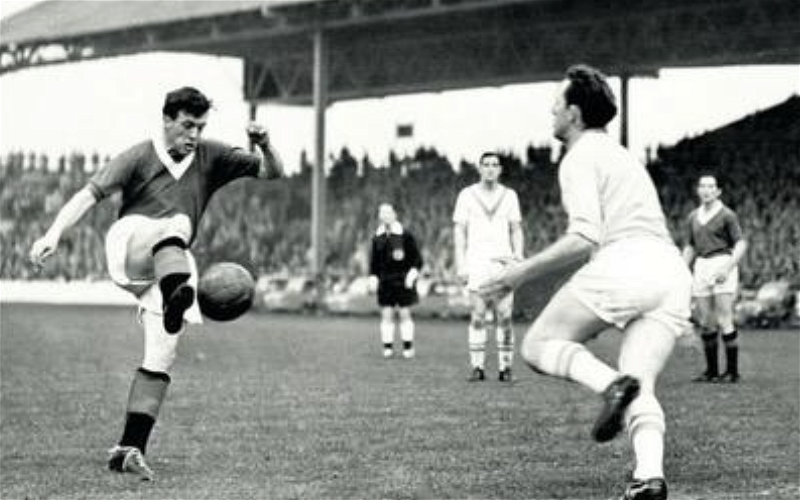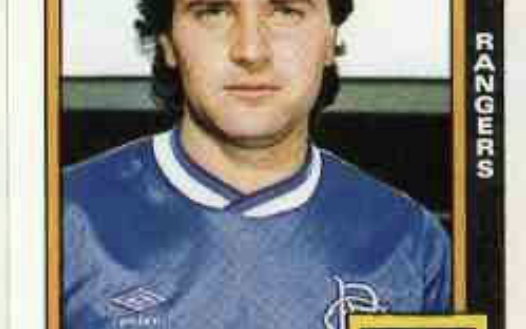By David Herd
There’s a Rangers team from the early 1960s with eleven names that trip off the tongue. This legendary line-up featured in the club’s 150-year anniversary mural, and virtually every supporter old enough to have seen them play will to this day talk of them as the greatest side they ever had the pleasure to watch. While it’s a fact to say that Ritchie, Shearer, Caldow, Greig, McKinnon, Baxter, Henderson, McMillan, Millar, Brand and Wilson actually only played as a full team together just five times, it’s also a fact to say that all eleven of them are members of the Rangers hall of fame, and are club immortals. Sadly, earlier today, it was confirmed that another member of this iconic team has passed away, Ian McMillan has left us to join so many other great Rangers names of the past.
Many tributes will be paid to this wonderful footballer, and absolute gentleman. His 200+ games for Rangers, his glittering collection of medals, his appearance in the club’s first-ever European final will all feature in many articles of remembrance. Some will also mention his fantastic career at his boyhood team Airdrie, the club where his heart always truly belonged. How five of his six Scotland caps were won while he wore the colours of The Diamonds, and how he would later become their manager and took them to the Scottish Cup final for the first time in 51 years. The stats and numbers bear testament to a great player and important figure in the history of both clubs.
But Ian McMillan’s death at the age of 92, at a time when he was thought to be the oldest living former first-team player, is about far more than facts and figures. He was a star at a time when Rangers, and Scottish football, had a galaxy of them. It took something very special to stand out when performing alongside and against such talent. As I never saw him play, I rely on someone else who did when I decide on where he sits in the illustrious history of Rangers Football Club. Like many before me, and no doubt many since, that means listening to your dad. And today, as I remember Ian McMillan, I think back to a conversation with my father in 1999.
Rangers had launched a vote amongst the supporters to find both The Greatest Ranger and also the Greatest Rangers Eleven. This sparked great debate anywhere that the fans gathered together. In pubs, in houses, in supporter buses all over the country, bluenoses were discussing the merits of Laudrup versus Cooper, Hateley versus Johnstone, and Baxter versus Gascoigne. I well remember our bus went on an away trip to Edinburgh and we got there hours before the match was due to start. We invaded a local hostelry and settled in for a few hours of true blue merriment. And not long after the first round of drinks was being enjoyed, the topic of conversation at our table turned to who had voted in the Greatest poll, and who had won their vote. My old man, who was the bus convenor at the time and one of the “old timers”, rhymed off his team, based on the Rangers players he had seen since his first trip to Ibrox in 1947. Fair to say, his line-up reflected three of the great eras of success that he had enjoyed over that half century. The Struth team of the post-war years, Scot Symon’s side from the early 1960s, and the 9-in-a-row heroes under Walter Smith, who at the time were all very fresh in everyone’s memory.
Goram, Young, Caldow, Greig, Woodburn, Baxter, Waddell, McMillan, Thornton, McCoist, Laudrup. Obviously, there were many there who were too young to have seen most of those players at their peak. And there was a lot of good-natured disagreement on there being no Sandy Jardine, no Davie Cooper, no Richard Gough, no Derek Johnstone, etc. But the players he had picked instead of them – George Young, Willie Waddell, Willie Woodburn and Willie Thornton – were all such revered names that most grudgingly accepted he might have a point. The one name that surprised everyone was Ian McMillan. So had to explain himself.
He told his audience that Jim Baxter was the greatest playmaker and best footballer he had ever seen, so the only question was who would play beside him in the middle of the park. And in his mind, there were three outstanding candidates for his dream team in that role. First, from the Iron Curtain days, there was Torry Gillick. A player of wonderful football intelligence, who formed a devastating right-sided partnership with his Greatest right winger, Willie Waddell. Gillick scored goals, created goals, could thread a ball through a needle, and was a player of wonderful natural talent. Then, from the very recent past, there was Paul Gascoigne. A magician on the ball, a game changing superstar who scored on the biggest occasions and another God-give talent like Gillick. Both were more naturally gifted players than Ian McMillan, but he had something they lacked.
McMillan was also a fantastic footballer, a player blessed with wonderful vision and game-awareness, who could read the flow of a game and step in to make a telling contribution when it was needed. He developed great partnerships with two different Scotland international right wingers, Alex Scott and Willie Henderson. His calmness in the red-hot atmosphere was perfect to get the best out of the teenage sensation Henderson, giving his winger the ball at the right time and in the right space for the “wee barra” to go do his stuff. He could score goals, although not as regularly as Gillick or Gazza, but in a team full of goals anyway, the two things that elevated McMillan into a starting role ahead of those other geniuses were consistency and familiarity.
My dad’s opinion was that Ian McMillan wasn’t just a phenomenal footballer, he was an incredibly consistent one. Unlike the mavericks who could disappear out of a game before a sudden game-changing moment, he was always involved, always influencing others, and always doing the right thing on and off the ball. He wasn’t a player to let the occasion get to him, or to get involved in running battles on the pitch. He was focussed, he was the ultimate professional, and he never let emotions get in the way of doing his job. And that job was winning for Rangers. And, crucially, he was familiar with Baxter. They formed perhaps the greatest midfield partnership in club history, McMillan less flashy, less gallus and less eye catching. But Baxter needed him in there, he was the one who found him in the space he wanted and the one who provided the perfect balance of artistry and efficiency. For my old man, Baxter and McMillan were like Morecambe and Wise or, as the old song goes, Love and Marriage. You can’t have one without the other.
He may, or may not, have been right. But that conversation has always stuck with me. John Livingstone “Ian” McMillan has gone. We mourn the loss of a great Rangers player from a generation we are losing too many. He was The Wee Prime Minister to everyone. To me, he was my dad’s Number Eight. As someone who never even say him play, thank you for the memories.



